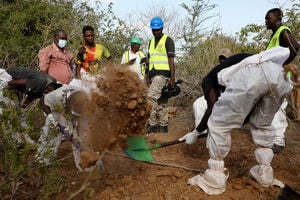
Youths demonstrate against the Finance Bill 2024 in Eldoret town, Uasin Gishu County on June 20, 2024.
I nicked the text below from an online chat group for police officers. It’s not the government that’s dealing with culture, the police too.
Leo station hakukua kunakalika
Hawa vijana tulishika jana waliamka wanaimba RnBs
Wanataka yoghurt
Wanataka Netflix
Wanapiga picha kila mahali
Tuliwafunfulia
(Our station not habitable earlier today
We were woken up by RnB songs from the young fellows we arrested
The demanded wifi
Yoghurt
Netflix
They were taking pictures all over
We just let the go!)
We all agree we didn’t read our children right. Few parents thought young people cared enough about what’s happening in the country to go to the streets.
The passion and fearless confrontation of the-powers-that-be as they demonstrated on Tuesday and Wednesday has changed many people’s minds about the Gen Zs.
There is a new respect for a demographic that many regarded as spineless, indecisive, irresolute and addicted to the “soft life”.
And it has serious implications for the country’s politics.
It looks like Kenya’s culture of struggle and rebellion is reborn in our children. The spirit of freedom that reigned in ourselves and our parents in the 1950s, 1980s and early 1990s lives on in our children.
This is not a question of politicians going to the slums and paying unemployed youths to come out, chant and throw stones.
These are normal children, from all classes — and especially the middle classes, which rarely publicly participates in political protests — expressing outrage at their government’s conduct.
Two forces have clashed in this yet unresolved conflict. One is of course President William Ruto, his style of leadership and the government Kenya Kwanza has formed.
President Ruto, I hear, is a smart and resolute guy, reputedly not given to suffering dissent or differing opinion.
No experience of autocracy
He is a conservative Kenyan politician forged in the kitchen of former President Moi. His exercise of power is raw and direct, unflinchingly pursuing an agenda and not too concerned with massaging public sentiment or jumping every time the public coughs.
His senior aides have choice insults for talking heads screeching their views on social media where Gen Zs live.
He has no apologies to make about his own expensive tastes, or those of his senior team, or the wasteful expenditure on the private jets he so likes.
The message from his economic team is that this mess was created by the previous government, not us, so shut up, pay the bills and be grateful we are fixing things for you.
The other force, is of course, our children. Gen Zs are many, a whole 33 per cent of the population, though some are as young as 11 (Gen Zs were born between 1997 and 2012) and therefore not politically relevant.
They were born in the last days of the Moi regime and have no experience of autocracy. They were bred to have strong opinions, to express them freely and for those opinions to count.
You see when we stopped raising children by beating the daylight out of them, discussion replaced violence as a key method of character formation. They are not used to having their views — not to mention feelings — ignored.
They told me they don’t like struggle and especially if it is one from which they can see no benefit; they expect to see a direct reward for their effort and they will not suffer people living off them, perhaps not even their parents.
Centres of protest
They have a massive social conscience; government should never have touched those sanitary pads.
“Do they know there are girls using waste paper as pads? Do they know there are children just here in Kajiado who use the same exercise book for all subjects because their parents cannot afford books?,” I was asked by my young interlocutor.
These children have zero concept of the traditional idea of tribe, at least not as a mobilisational tool. Perhaps their rural counterparts might still have a strong ethnic identity.
But they have a very strong sense of kinship as a generation. They care deeply about anything that happens to their generation anywhere in the world.
This is why they are so passionate about Palestine and the fate of children there.
If anyone harboured dreams of establishing a repressive Museveni-type government here, the human cost for that now would be quite high; perhaps too high. And operating without careful regard for public opinion will come at an equally high electoral cost.
Finally, the centres of protest seem to have changed. This season is not about youth from the slums mobilised by politicians, it is youth from all over the country to some extent having mobilised themselves.
The traditional protest class will have to re-invent itself to remain relevant.
And the police will need to learn to host a different kind of customer; one who demands yoghurt for breakfast.
Mr Mathiu, a media consultant at Steward-Africa, is a former Editor-in-Chief of Nation Media Group. [email protected]










